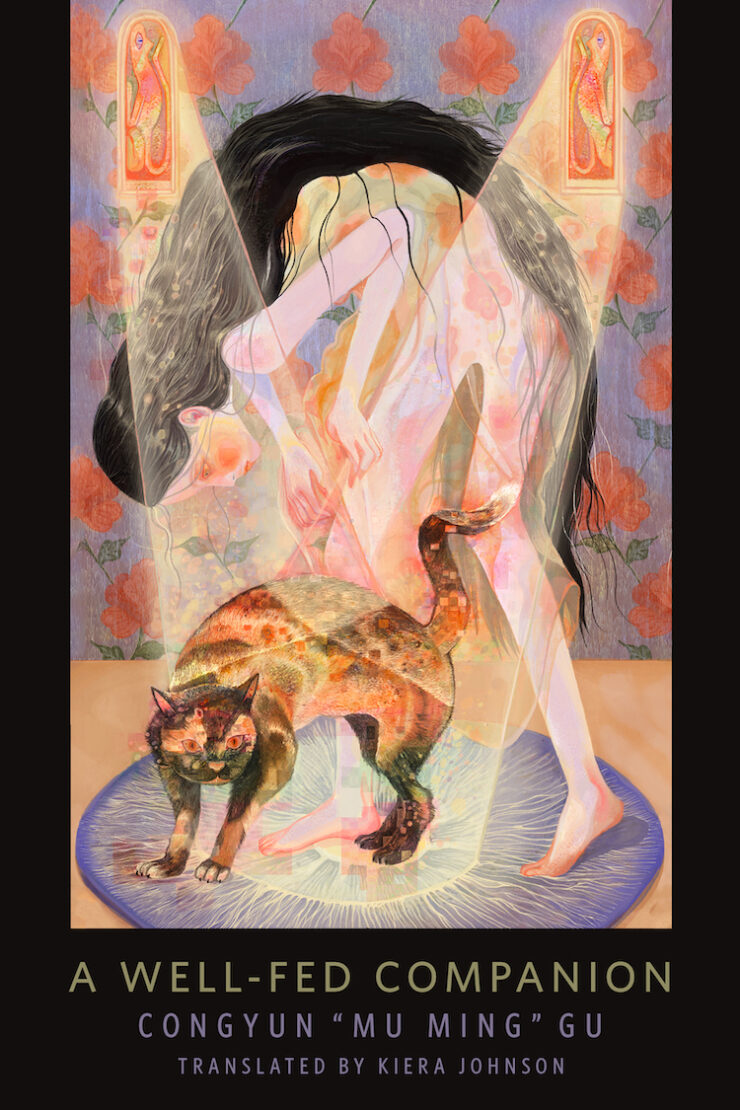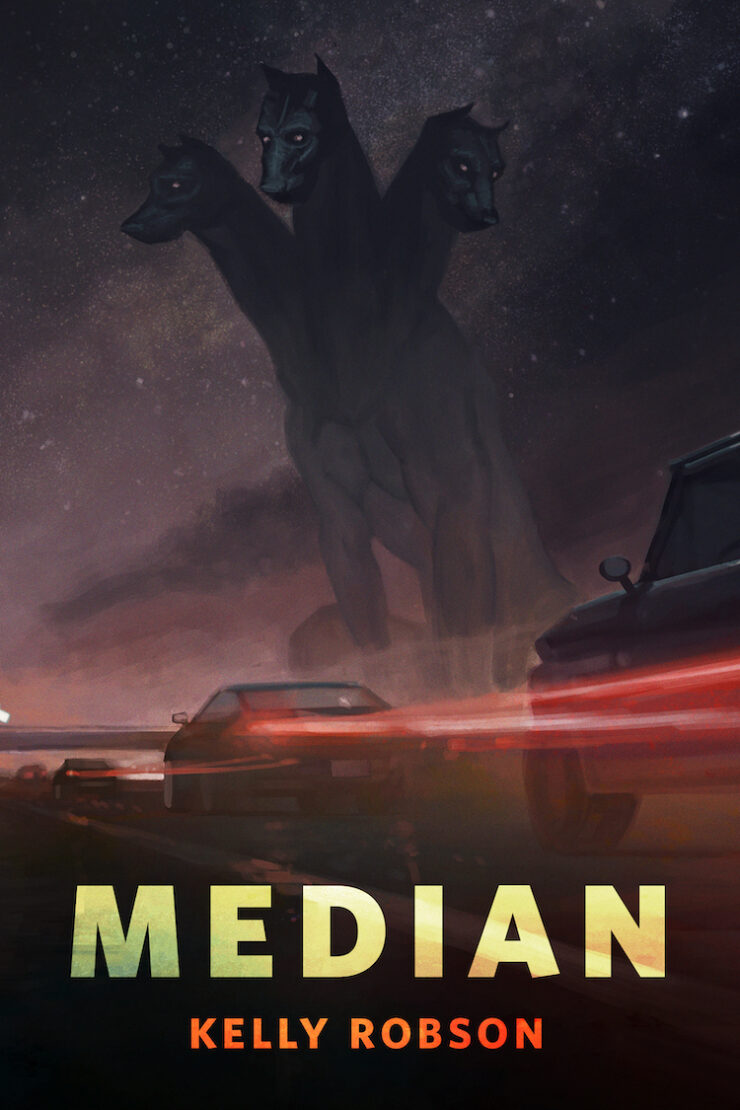We are thrilled to share an excerpt from Jared Pechaček’s The West Passage, along with some of Pechaček’s chapter art and notes. The West Passage will be available on July 16 2024 from Tordotcom Publishing.
A palace the size of a city, ruled by giant Ladies of unknowable, eldritch origin. A land left to slow decay, drowning in the debris of generations. All this and more awaits you within The West Passage, a delightfully mysterious and intriguingly weird medieval fantasy unlike anything you’ve read before.
When the Guardian of the West Passage died in her bed, the women of Grey Tower fed her to the crows and went back to their chores. No successor was named as Guardian, no one took up the fallen blade; the West Passage went unguarded.
Now, snow blankets Grey in the height of summer. Rats erupt from beneath the earth, fleeing that which comes. Crops fail. Hunger looms. And none stand ready to face the Beast, stirring beneath the poisoned soil.
The fate of all who live in the palace hangs on narrow shoulders. The too-young Mother of Grey House sets out to fix the seasons. The unnamed apprentice of the deceased Grey Guardian goes to warn Black Tower. Both their paths cross the West Passage, the ancient byway of the Beast. On their journeys they will meet schoolteachers and beekeepers, miracles and monsters, and very, very big Ladies. None can say if they’ll reach their destinations, but one thing is for sure: the world is about to change.
Buy the Book
The West Passage
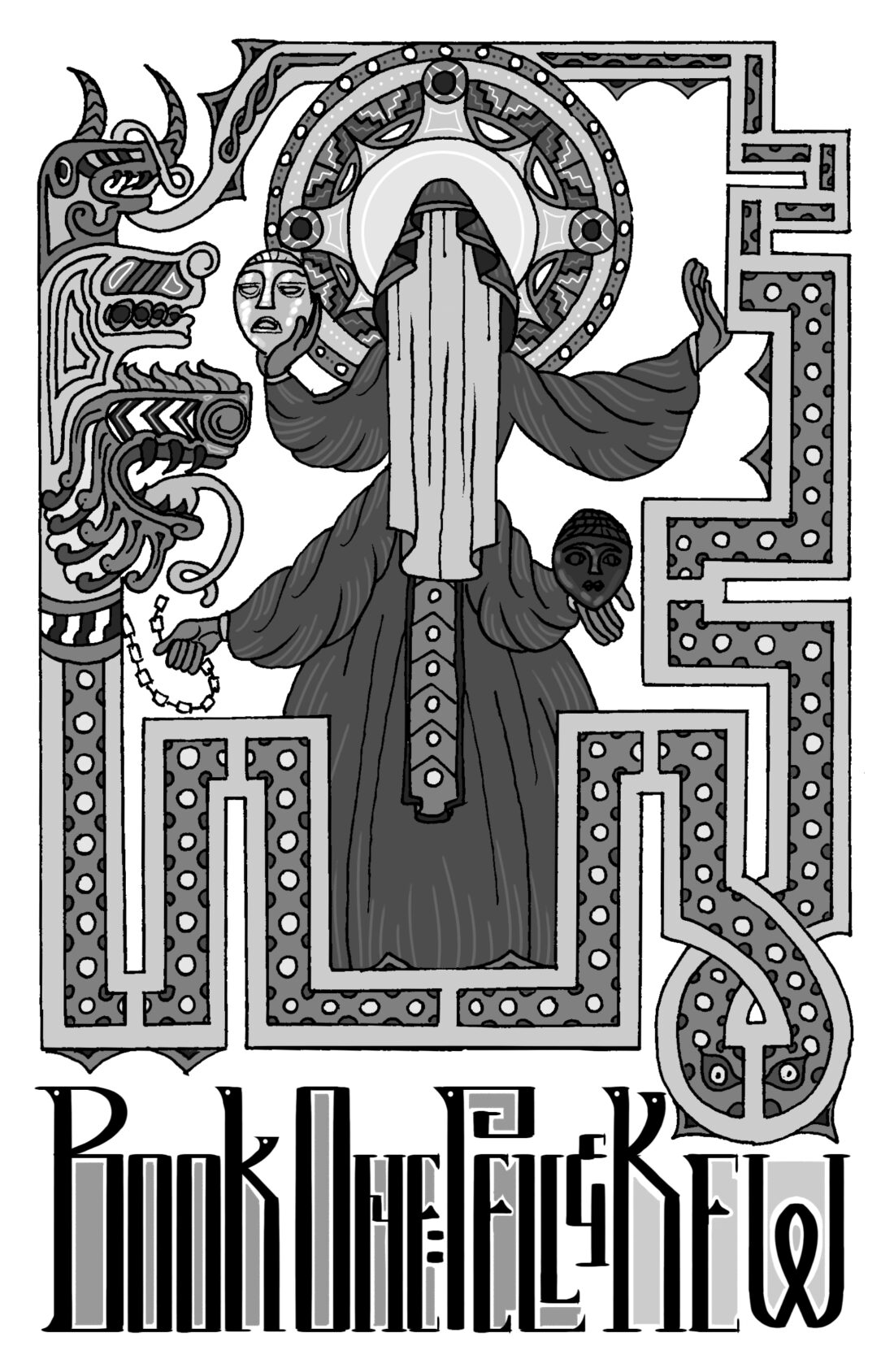
For all the illustrations, I asked myself: How would people in the world of The West Passage depict these events? This is a book where objective truth is hard to come by, so representing events realistically felt like an imposition of one view upon the narrative. (Yeah, I’m the author, but I’m not a dictator!) And so, as the story moves from area to area, or from character to character, the visuals shift with it through different periods of medieval art. Here, the first ever Lady of Grey battles the ancient enemy of the palace, known only as the Beast. In the world of The West Passage, the Ladies are the palace’s eldritch builders, rulers, and protectors, each responsible for her own domain. This battle belongs to a time so long ago it’s basically myth, so rather than medieval art, some of the masks are inspired by Bronze Age sculpture.
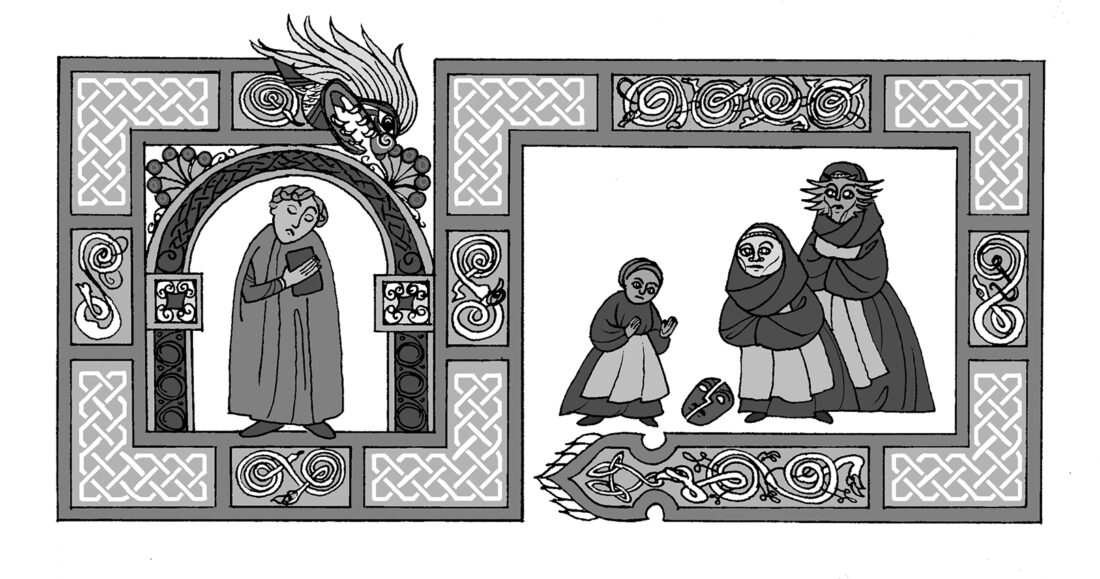
Our story starts in Grey House, the oldest and most secluded region of the palace. It resembles a monastic community: dedicated to ritual and supported by people within its demesne. For art related to Grey and its Mother, I turned to insular Celtic work from about 650-800 CE, like the Book of Kells and the Lindisfarne Gospels, to associate these people with isolation, faith, and the periphery of empire.
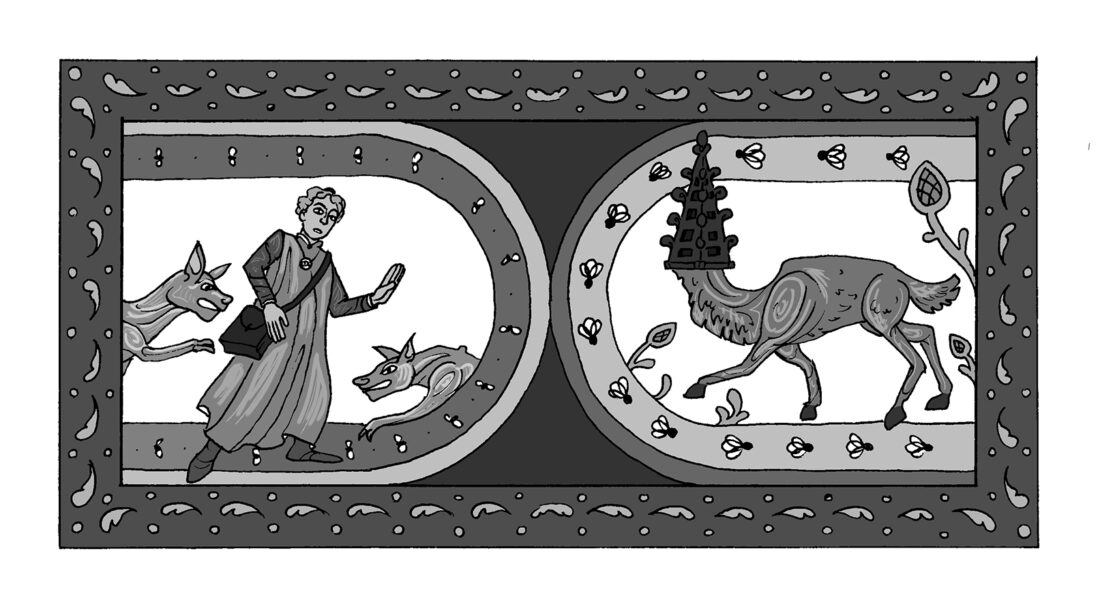
The other major visual style of The West Passage comes from the Gothic period. Our second protagonist, Kew, apprentice to the Passage’s deceased Guardian, is much more book-learned than anyone else, so his chapters reflect the broader trends within Europe from 1200-1450 CE. As he goes along, the art shifts later and later within that time frame, but at this point in the story, we’re still at the start. This image is a direct reference to a page of the thirteenth century Aberdeen Bestiary—one of several similar books that Kew’s art hearkens back to. Bestiaries are, after all, part of his job.
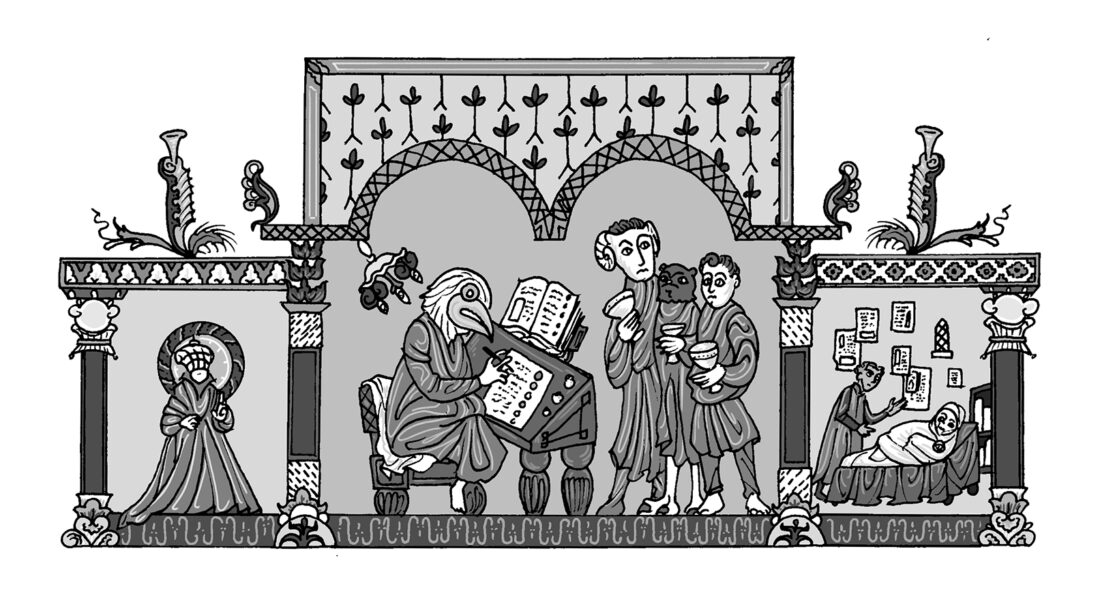
The interlude chapters peek in on what’s happening in other areas that our heroes don’t see. Here, we’re visiting Blue Tower, the artistic and industrial center of the palace, where a certain manuscript is in production. Blue’s art pulls from Armenian illumination, particularly the work of Toros Roslin, which sits at a very beautiful intersection of European Christian and West Asian Islamic influences. I use it here partly because Blue is also an intersection for the palace, but mostly because I’m part Armenian. (One of our protagonists is visually based on my great-grandmother, actually!)
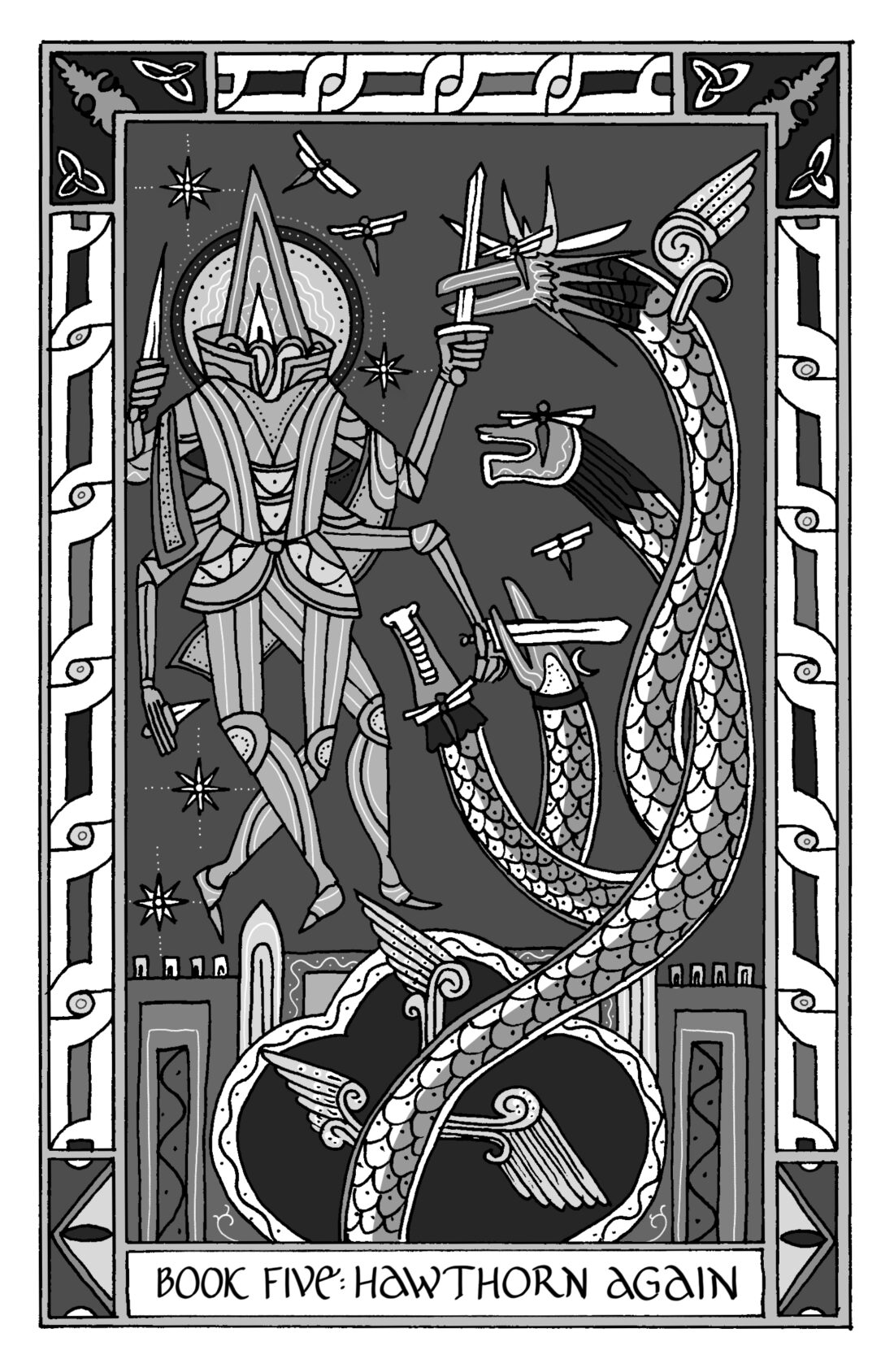
The experience of revelation is very important to the story. So is the characters’ devotion to their godlike Ladies, which is strongest in the warlike region of Red. And so for art related to Red, I have turned to Beatus of Liébana’s Commentary on the Apocalypse, specifically the gorgeously weird Facundus manuscript from 1047. In this image, the first of the Red Ladies, surrounded by her dragonflies, fights against the Beast. The sinuous Beast itself here is inspired by Facundus’s take on the Great Red Dragon. As for why it has more heads than its first appearance, plus a lot of wings—well, I wouldn’t dream of revealing.
Chapter 1
The Mask Is Broken and the Women in Grey Say Very Little About It
With the guardian dead, the question remained: Who would do it? There was talk among the women of sending to Black Tower for someone, or of the old woman’s apprentice taking over, but he, a pale youth who looked more used to handling books than beasts, turned paler when it was mentioned to him, and they would not shame him, nor distress themselves, by speaking of it further. But in the meantime, the West Passage remained unguarded.
The women in grey took the body for washing and wrapping. Due to the importance of the deceased, Pell, who was their apprentice, was not permitted to touch, only to look, and as she looked she saw the pale youth slip something off the old woman’s corpse just as everyone entered the small dark room. A trinket of some sort, on a string, perhaps a keepsake promised to him by the old woman. Pell said nothing.
A strong smell of death had settled on the room. It had not been a dignified death, and the old woman was very dirty. There was a song to be sung during washing, but the women in grey could only hum it through closed mouths. They filled basket after basket with soiled linen before she was clean. Yarrow, the taller woman, directed Pell to take the baskets out to the burnyard reverently but quickly and set them afire as soon as possible.
“And for North’s sake,” said Yarrow, “don’t touch them, and wash your hands directly—seven times, remember, with some lavender oil to finish.”
Pell did not need to be told, but it suited Yarrow to order and be obeyed, and it suited Pell to please Yarrow. The Mother of Grey House was a tall, stern woman, and the backs of her strong hands were covered in spines; you didn’t want her boxing your ears. Pell did as she was told—burnt the baskets too, since they seemed fouled beyond repair—and as the linens and wicker settled into charred shreds in the furnace, she went to wash. Smelling of lavender, she returned to the old woman’s room, where the apprentice sat in the corridor next to Arnica’s wheelbarrow, his knees drawn up to his chest.
“Out of my way,” said Pell, an important person with important tasks. Someday she might take Yarrow’s place. Then people would stay out of her way and not just sit in it, staring.
The apprentice only moved a fingerwidth, as if his misery held his body full and taut and he couldn’t compress it anymore. He did not look at her.
“I’m needed inside,” said Pell, which was not strictly true. Yarrow and Arnica had only told her to keep out of the way and watch.
“What’s to become of me?” said the apprentice.
She could not remember his name, and did not have the patience to try. “I can’t speak for the future, but in the present, if you don’t let me past, I’ll box your ears.”
They were the same age, or nearly, but Pell could talk like Yarrow when needed. He moved.
“Thank you,” said Pell. To make up for her manner, she took a stick of angelica from her sleeve and offered it to him. He stared at it as if it were some unknown beast. “Take it,” she said. Then again, more loudly, and added, “It’s a gift.”
He obeyed. Pell left him and entered the room, which smelled much fresher now, in time to pick up the winding sheet and hand it to Arnica. Fitting so immediately into their rhythm kindled a spark of pleasure in her heart, and in its warmth she forgot the apprentice.
The women in grey wound up the old woman in the white cloth. Over her shrouded face they strapped a green stone mask with closed eyes. They could sing now, and Yarrow’s fine clear voice filled the room with the winding-song, while Arnica’s huskier one rumbled in the flagstones. Pell was not allowed to sing the songs yet, but she memorized the tune and the way Yarrow and Arnica would clap in unison at certain beats and words. In her mind, she built a room for the winding-song and hung each line as a picture on the walls.
The women in grey hoisted the corpse onto a stretcher—Pell could help here, as the women in grey were really not much younger than the old dead woman—and carried her out. Pell was left to clean up.
Any unused linens and herbs must be repacked in their chipped urns. The floor must be swept and mopped, and the sweepings put in a basket to burn.
The room was not much bigger than any others in the palace. It held a bed, a stool, a chamber pot, a large wooden table, and a wardrobe. One wall had three small windows, latticed with stone like the others in this old part of the palace. Nothing was very remarkable, except an open wooden chest at the bed’s foot, where three or four books lay.
Books. Women in grey were not supposed to meddle with personal property, but Pell was not one of them yet. She could still do some of the forbidden things, like eat meat or handle bread. So when the floor was swept, and she’d pulled herbs out of her sleeves to steep in the mopping water, she knelt by the chest and picked up the smallest book. To her disappointment, it was all words. None of the lovely pictures that she’d seen over in the Archives, with patterns winding over pages like vines. What use was a book that only had words?
“Put it back,” said a timid voice. The apprentice had entered the room.
“Out! Get out!” said Pell. “We aren’t done yet!” She scrambled to her feet, slamming the chest shut as she rose.
“But the books—” he said.
“Are safe here!” she said. “Women in grey don’t take. Get out! It’s not clean here!” She snatched up the broom and shoved it at his feet.
Even though he was two heads taller, he obeyed. Either she had absorbed some of Yarrow’s immense personal authority, or he was incapable of confronting anyone. Though Pell would like to believe the former, she knew it was probably the latter.
She slammed the door shut after him and set about mopping. The water was fragrant with lavender, thyme, and lemon, and it chased the last of the death-smells away. She stripped the bed and put the soiled clothes in the basket. Someone else would take the old woman’s belongings—probably the apprentice, but it wasn’t Pell’s concern either way. The women in grey only handled death and birth.
When she came out of the room, he was gone. Pell took the burn-basket to the furnace and tossed it in, then went back for the urns. She loaded them into the wheelbarrow and trundled back to Grey Tower. Its atrium was still dripping with the morning’s rain, and Yarrow and Arnica were struggling up the spiral ramp with the stretcher.
Pell took the things into the storeroom and put them on the shelves. When she emerged into the atrium again, the women in grey had not made much progress. Before she reached them, Arnica stumbled and the stretcher twisted, tumbling the old woman’s body off. Yarrow stopped it falling from the ramp, but the mask slipped and plummeted.
“Catch it, girl!” said Yarrow, unnecessarily and too late. The mask evaded Pell’s outstretched hand and hit the mossy flagstones with an ominous chnk. “Is it whole?” Yarrow added as she and Arnica maneuvered the corpse back into place.
Pell gathered up the mask. It was in two halves, and badly chipped and scratched. She took it up the ramp anyway.
“Ah, well,” said Yarrow.
“Some glue,” said Arnica vaguely.
Yarrow sighed. Arnica sighed.
Pell, remembering some of the long, long rhymes, asked, “Isn’t that a bad omen?”
“Oh, that’s what we always say,” said Arnica. “Truth is nobody knows.”
“The truth is,” said Yarrow, “that the masks are our responsibility. Shame it happened, but someone might fix it in time.” Someone was usually one of the girls. “Take Arnica’s place, girl; was her old foot that slipped and got us here. If you mayn’t sing, you may at least carry.”
Arnica took the mask and stood aside to let Pell pick up the end of the stretcher. This was a great honor, and Pell flushed with pride as she stepped forward. She found it difficult to maintain her pride, however: the ramp was slippery with moss and rainwater. Old age or not, anyone would be hard-pressed to walk it. And as it coiled around the atrium wall it seemed to grow steeper and steeper, so that the risk of falling made Pell’s head swim. You’d splatter on the uneven floor like an old peach.
“By rights someone should’ve been singing this whole time,” said Yarrow as they wrestled the corpse up and up. “But neither of us had the breath. Arnica, you might, now you’re unburdened.”
Arnica immediately began. Her deep voice echoed and re-echoed off the stone walls until the whole of Grey Tower seemed to be one droning throat. Pell’s very bones vibrated.
Pell had never been more than halfway up the ramp. It was forbidden for apprentices, but Yarrow, uncharacteristically, did not mention to Pell the immense distinction conferred on her. Maybe Pell had been chosen as her apprentice. The years of learning and training might finally go somewhere. A warm glow spread up her neck and across her face at the thought. To be the next Yarrow . . .
They passed many doors, some whole, others decayed so Pell could glimpse the rooms beyond. Full of urns some of them were, others of moldering chests or furniture or miracles. One seemed full of people, until she looked again and saw it was only dozens of statues with veiled eyes. Grey Tower had always been for the dead, but it seemed in earlier years it had been for other things, too.
They reached a landing and Yarrow stopped, pressing her spiny hand to her side.
“A moment,” she gasped. “North above, a moment.”
Pell took the opportunity to look around. There were only three levels more of Grey Tower, each lined with twelve great yawning arches. The arches rested on pillars carved like people with animal heads, no two alike. Each arch opened onto a dark space, like a huge niche, but with the sun now shining straight down into the atrium, Pell could not see what lay beyond. The ramp led up past the arches to the top of the tower, where a wide parapet lay open to the sky.
“Give us a share,” said Yarrow. Arnica had taken some nuts out of her pocket and was cracking and eating them with quiet pleasure. Pell’s face must have registered her shock, for Yarrow rolled her eyes. “We have an awesome duty in an awesome space, but a body does like something to crunch now and then.”
“She certainly did,” said Arnica, nudging the corpse with the tip of one dirty shoe. “All them offerings of ortolan and almond. Proper thing would’ve been to share it out again, but time after time you’d try to talk to her and hear naught but the crunch of little bird bones. She didn’t even share her name with that apprentice. Didn’t swear him in before the end. Couldn’t stand the thought of another Hawthorn while she lived, I suppose. And here we are.”
Yarrow chuckled, a sound like a pestle in a stone mortar. “All them West Passage guardians were always of a sort. Whoever’s next’ll eat a songbird banquet right down to the feathers and save you out just a talon or a half-gnawed beak.”
“Best get a new guardian soon,” said Arnica through a mouthful of half-chewed walnut. “Or Grey Tower’ll have more work than it wants, if the stories hold true.”
Both Yarrow and Arnica made a curious gesture of the left hand, common to the elders of the palace, that always accompanied mentions of the West Passage. Pell did not.
“Who’ll do it, I wonder,” said Yarrow. She tossed a shell out into the air. A moment later a distant click echoed from the floor of the atrium. “That boy of hers? I’ll give him the name of guardian if he asks, but we’d have as much luck with a statue of a Lady.”
“He might do,” said Arnica. “Not ’sif there’s other choices. If he knows his duty . . .”
The women sighed in unison. Duty. Everyone in Grey House knew theirs. The guardians, though, in their little court—who could say what they knew?
“What do the guardians do?” said Pell.
“Protect,” said Arnica, who was generally more disposed to answer that sort of question. “Ain’t you paid attention in lessons?”
Stung, Pell said, “But protect from what?”
“The evil.”
“What evil?”
Arnica spoke around a mouthful. “The one that comes through the Passage now and again. Ain’t no matter for us, though. It’s guardian business.”
“Then let them gossip about it,” said a bored Yarrow, standing and brushing nutshells off her grey gown. “Let’s be off.”
A nut fell from Arnica’s hand unnoticed. Out of habit, Pell scooped it up and stuffed it into her sleeve for later. You could hide a lot of things there, if the women came upon you suddenly.
The tower was now quite hot, and Pell and Yarrow were both dripping with sweat when they reached the top. The wide rampart shimmered under the sun, and the three took shelter in the shade of a turret to catch their breath again.
The five turrets of Grey Tower each had their own name and song, and each was meant for a different section of the palace’s people. The old woman needed to be taken to Tamarisk, whose floral moldings were worn away to nubs. Pell’s body, when her time came, would go to the Hand, in whose shade they nestled, with its tumbled parapet and meticulously maintained yellow chevrons.
Pell recovered faster than the women. Being so high up was a rare treat, and being atop Grey Tower had never happened to her before, so she would take advantage of it. She went over to the rough granite parapet and got up on her toes to peer over it. All the ruinous grandeur of the palace was at her feet.
The sun glinted on the South Passage hundreds of yards away and below, where water gurgled through the chasm beneath the palace. Bridges crisscrossed it, bulging with houses. A pigeon launched itself from a courtyard, drawing her eye up to faraway Red Tower, purpled with distance, its beacon dull in the light of day. If a wind came from there, you could get a whiff of the sea. In the windless noon, white smoke from that eternal fire drifted over all the southeastern district of the palace. Much closer was lapis-domed Blue Tower, rising from a sea of white plaster walls, swirling with pigeons and the bright flecks of hummingbirds who came to drink from the flowering vines that spilled down its sides. A woman in a near window was hanging laundry. She waved at Pell, who ducked beneath the parapet.
Yarrow and Arnica permitted her to look from here, close to the corpse that was their duty, but if she went around to the other side of the rampart to see Black and Yellow Towers, that would be leisure. Suddenly Pell would be shirking. Anyway, Yellow Tower was plainly visible, slashing into the sky like a knife into flesh. That way lay the West Passage. Black Tower was more to the north, hidden behind the turret where its people went after death: Varlan’s Love.
Grey was the living heart of the palace, built of the grey bedrock under everything; Grey was the oldest; Grey was the center. Grey was death.
Yarrow’s whistle startled Pell. Five notes, starting high, and descending down minor thirds: a call Pell had heard from the foot of the tower many times, but never so close. It pierced the eardrums and reverberated through the hollow center of the tower as if it were a resonating chamber.
“All right, girl,” said Yarrow. “Let’s get her over to Tamarisk quick, before they arrive.”
Arnica resumed her song as Yarrow and Pell trotted the stretcher along the parapet. In the heat, the old woman was beginning to smell. She’d had a horrible death to begin with, but how much more horrible to die in high summer and make every bit of your passing a burden to others.
Tamarisk, like all the turrets, was open and hollow on its inner face. A spiral staircase wound up through three platforms to the open roof; you could watch anyone climbing it as if looking at the open side of a dollhouse. The stretcher stopped at its foot, jarring Pell’s stomach.
“No, girl,” said Yarrow. “Arnica helps for the last bit. You’re not yet a woman.”
Not yet. Pell handed the stretcher off to Arnica, and the two women started up the stairs. She watched their laborious progress, and wondered whether Arnica would make it. Twenty steps to the top, nineteen, eighteen, seventeen, and then Arnica stumbled on the fifteenth. They nearly lost the body, and the mask almost fell once more. But Yarrow was determined, and they pushed on.
A murmur filled the air. It rose in volume, came nearer, turned into a rustling and a cawing. Pell looked over her shoulder.
Streaming past the bright face of Yellow were hundreds of crows. They knew the whistle and what it meant, and by ancient treaty they had arrived. Yarrow and Arnica set down the body and reached the safety of the stairs just in time. In a moment, Tamarisk was covered in a shivering blanket of black. Scratching, rasping, tearing, squelching: the noise was horrible.
The old woman did not take them long. The crows even carried away the bones, and for a moment their neatness was exhilarating, until Pell saw the bones dropped into the Passage, and she remembered: to get at the marrow, the crows had learned to break bones on the canyon rocks, and there were red-daubed vultures who fed on them as well. Everyone who had ever died in the palace lay splintered along the banks of the river.
All that remained atop Tamarisk was a bloody shroud and the damaged mask. Yarrow and Arnica stood watching it, as if something might move. Pell stood with them. As the afternoon wore on, Pell’s headscarf soaked up the heat. A trickle of sweat ran down her back. The two women must have been miserable in their wimples, long gowns, and leather aprons.
“Oughtn’t we clean up, Mothers?” said Pell.
“A moment,” said Arnica. “A bleedin’ moment.”
“Hush, girl,” said Yarrow.
An iridescent butterfly fluttered past Pell’s nose. Its wings flickered like flame. She put out her hand to tempt it into landing there, but Yarrow slapped her.
“Don’t interfere,” said Yarrow, as Pell rubbed the back of her hand.
The butterfly made its way to the top of Tamarisk and landed on the shroud. Another followed. Then another. Soon the shroud shimmered with their wings.
“They like to sip us up,” Arnica whispered. “Anyway it’s less to mop.”
When the last of the old woman had been drunk down hundreds of tiny throats, Yarrow solemnly mounted the stairs once more. She wrapped the mask in the shroud and carried it back down.
“To the glory of the Lady,” she said.
Pell followed her and Arnica onto the ramp. The sun had moved and the atrium was beautifully cool. Down they went, singing another song, to place the mask on its plinth, where it would wait for the next guardian to die.
The two green halves looked balefully at Pell. While Yarrow and Arnica took care of some other business, she ran some rough twine through the eyeholes and tied it together. Would there be consequences? It was only a mask, after all. And the women didn’t seem worried.
Pell put the issue out of her mind. It should not concern her in the slightest. The palace took care of such matters, and she had a tale to tell the other girls.
Excerpted from The West Passage, copyright 2024 by Jared Pechaček




